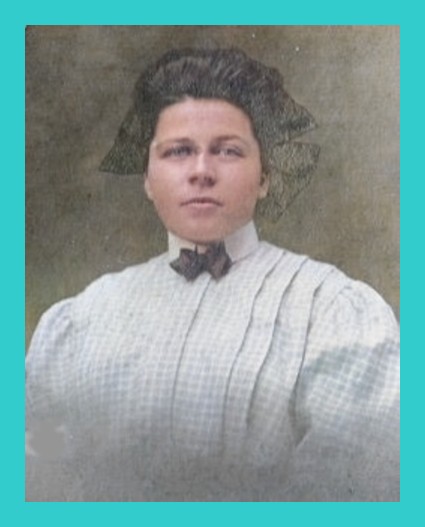An undated early portrait of Sarah Irene [Lebo] Shott (1891-1982), a one-room schoolhouse teacher of the first half of the 20th century.
Irene Shott was the subject of a feature that appeared in the Harrisburg Patriot, April 24, 1981:
ONE-ROOM SCHOOL TEACHER CONTENT WITH MEMORIES
“Today’s teacher has access to more things, but in my day the children learned their lessons more thoroughly, “90-year-old Irene [Lebo] Shott said as she recalled her days as a one-room school teacher.
“I was often told that we taught better than today’s teachers,” she continued. On the other hand, she explained the problems with today’s education may not lie with the teachers but with consolidated schools that are too big.
Shott was born in 1891 on the Michael Enterline farm in Wayne Township, five miles east of Halifax. She is a sixth-generation descendant of The Rev. Michael Enterline, founder of St. John’s (The Hill) Church, south of Berrysburg, and namesake of the Powell’s valley settlement of Enterline. The farm is still in the family, with an eight-generation descendant of Michael Enterline now occupying the premises.
Shott’s home school as a child in Enterline was the first she was assigned to as a teacher during the 1909-1910 school term. She went to Millersville Normal School for the next three years before teaching at Enola. Missing her familiar country surroundings, Schott returned to the Enterline School where she taught until 1934.
In 1918, she married Leroy Shott and moved to Halifax, since her new husband was a banker there. However, she continued to teach in country schools, moving in 1934 to the Waynesville School until her retirement in 1951.
Reminiscing, she recalled that years ago the school day began at 9 a. m. and ended at 4 p. m. The school bell in the belfry rung at opening and closing times to let the parents know the children had arrived safely or that they would be coming home soon.
In the old schools, she said, first and second graders needed special attention to get their school careers off on the right footing. Older pupils were then combined into three classes rather than six. The “3 r’s” were taught, along with history, geography, civics, spelling, English, art, and music. At the time, she said, this was considered a well-rounded education, especially for country children attending a one-room school.
Shott recalled with pride, “We never spoke Pennsylvania Dutch in school, not once, always English.” Yet, in theatres, almost all of the children spoke the German dialect fluently, since this was the basic language of their parents.”
“I went early every morning and made my own fire,” Shott remembers, Most of the time the sturdier boys carried in the coal and also helped carry a large milk can containing drinking water to school.
“I had a very good school,” Shott said. “I treated the pupils as if they were my own children and they responded very well to that. The children would do anything for me. They called me ‘Irene’ just like their parents did.
When Shott began teaching in 1909, she received $40 a month. When she retired in 1951, she received $250 a month. No matter how much she was paid, Irene Shott loved her time spent in the classroom.
Late each winter, the school put on a program of entertainment and achievement which received many praises, she recalled.
“It was mostly just a fun time for all the grades. We had to have some fun, you know, through the year.”
Another even in the country-school year was the county examinations, given by the county school superintendent’s office to test eighth-graders readiness for high school.
“We were always ready,” Shott said, “and that took some doing to be ready for.”
Leroy Shott died in 1967 and Irene, childless, lived alone in Halifax until she fell victim to a stroke in 1975. After recovering in July 1975, she came to Susquehanna Lutheran Village [in Millersburg] and said she is enjoying her stay there.
Having taught three generations of several families, Shott receives many visitors.
“Hardly a day goes by that someone doesn’t come,” she said.
In her spare time she enjoys reading and working in the hobby shop. She also joins a sharing group each week with other residents of the village.
After a long teaching career, Irene Shott reflects on the children she has taught and what they have done with their lives, Most of them were a success, she feels, and some of that success shines right back to a teacher who cared in a one-room country school.
______________________________________________
Article from on-line resources of the Free Library of Philadelphia.
Corrections and additional information should be added as comments to this post.
